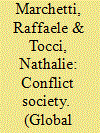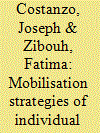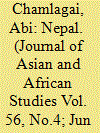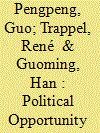|
|
|
Sort Order |
|
|
|
Items / Page
|
|
|
|
|
|
|
| Srl | Item |
| 1 |
ID:
088907


|
|
|
|
|
| Publication |
2009.
|
| Summary/Abstract |
This article analyses the relationship between civil society and conflict. It aims to provide an analytical framework to unpack this complex relationship and assess the impacts which civil society may have on conflict. In a first section, it analyses the implications of context on civil society, namely the implications that statehood, democracy, nationalism, development and international presence have on the nature of civil society. In the second section it examines more specifically the role of civil society in ethno-political conflicts, or as we rename it 'conflict society'. The final section turns to the identification of different factors determining the impact of civil society on conflicts, including political identities, frameworks of action and political opportunity structures in which civil society actors operate. Accordingly, the different combinations of these determinants lead to the formation of civil society actors and ensuing actions that can either fuel conflict, sustain the status quo, or build peace
|
|
|
|
|
|
|
|
|
|
|
|
|
|
|
|
| 2 |
ID:
127850


|
|
|
|
|
| Publication |
2014.
|
| Summary/Abstract |
Though sharing a common territory, the cultural spaces of Brussels are divided according to a complex structure where Francophone and Flemish Communities play a dominant role. These two language-based communities set separate cultural policies and programming for their residents in Brussels. Within this fragmented structure, local socio-cultural actors have mobilised promoting cross-Community collaboration towards a shared vision for the Brussels-Capital Region (ex. Cultural Plan for Brussels). Further, individual artists themselves have developed strategies to participate in Community-defined cultural programming and to gain recognition for their talent as local (Bruxellois) artists regardless of their ethnic, linguistic or migrant background. This article explores how socio-cultural actors and artists have mobilised to reframe 'culture' in Brussels, and to gain access to cultural venues particularly in the case of migrant and migrant-origin artists whose engagement and recognition in Brussels' cultural scenes have been little studied.
|
|
|
|
|
|
|
|
|
|
|
|
|
|
|
|
| 3 |
ID:
178392


|
|
|
|
|
| Summary/Abstract |
The purpose of this article is to compare Nepal’s two Tarai/Madhesh Movements using the political opportunity structure theory of social movements. Tarai/Madhesh Movement I launched by the Forum for Madheshi People’s Rights in 2007 became successful as Nepal became a federal state. Tarai/Madhesh Movement II launched by the United Democratic Madheshi Front of the Tarai/Madheshi parties and the Tharuhat Joint Struggle Committee of the Tharu organizations failed as political elites disagreed about the need to create two provinces in the Tarai/Madhesh. While Tarai/Madhesh Movement II confirms that a social movement is more likely to fail when political elites align against it, Tarai/Madhesh Movement II refutes the theoretical proposition. Tarai/Madhesh Movement I suggests that the sucess of a social movement is more likely despite the alignment of political elites against it if its central demand consistently sustains the support of its constituents.
|
|
|
|
|
|
|
|
|
|
|
|
|
|
|
|
| 4 |
ID:
179946


|
|
|
|
|
| Summary/Abstract |
How does "rightful resistance" take place in contemporary rural China? The continuously evolving village election system, the abolishment of the agricultural tax, and a new insistence on fighting corruption seemingly have created more space for the rural population in China to defend its rights. However, the central state's emphasis on solving the so-called three rural issues (sannong wenti 三农 问题)—raising incomes and welfare for the rural population, modernizing the countryside, and developing industrialized and modern agriculture—in a topdown manner and the continued use of "project-based management" have also greatly decreased the ability of the rural population to influence the agenda of the state and have thereby increased the potential for friction between the local state and its rural citizens. This article is a case study of a dispute between villagers and local cadres about the implementation of a reforestation project. While the case shows that villagers have several avenues for protest, it also hints at the low effectiveness of their protest and the continued existence of important structural obstacles dealing with different levels of the administration, including the atomization of villagers, the volatile nature of their interest coalition, and a profound lack of allies in society.
|
|
|
|
|
|
|
|
|
|
|
|
|
|
|
|
|
|
|
|
|